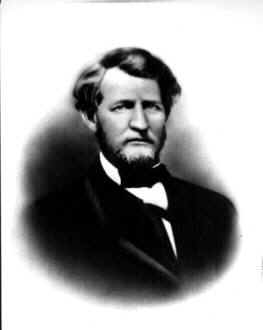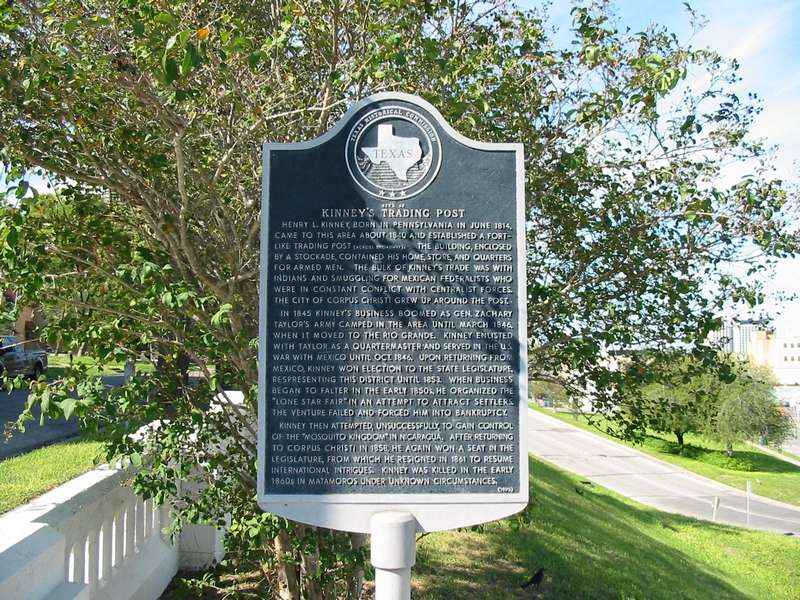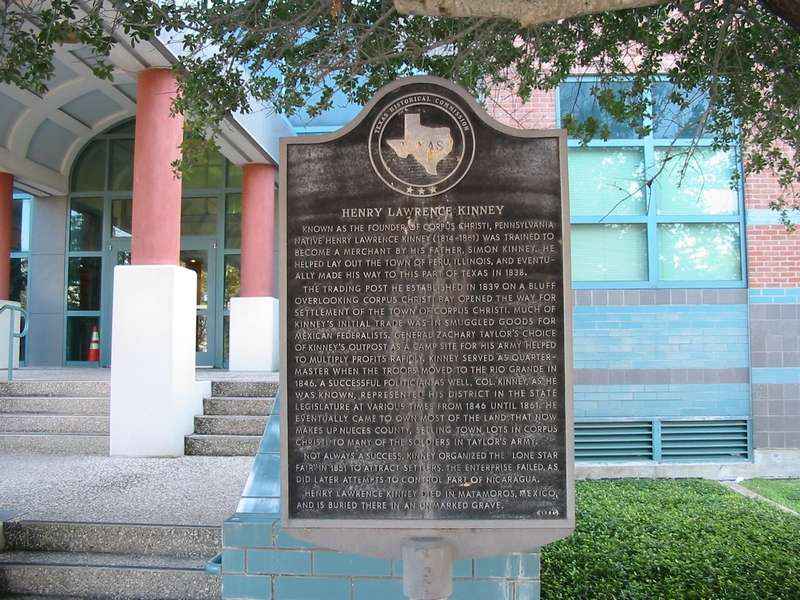
Corpus
Christi History
Col. Henry L. Kinney
KINNEY, HENRY LAWRENCE (1814-1862). Henry Lawrence (or Livingston) Kinney, land speculator, was born near Shesequin, Pennsylvania, on June 3, 1814, the son of Simon and Phoebe (Cash) Kinney. After his mother's death in 1835 he moved with his father to Illinois, where he settled in Indiantown. He became involved in land speculation around Peru, Illinois, with his brother. The venture was ruined during the financial panic of 1837-38, and Kinney and his brother fled the state. In 1838 Kinney appeared in Texas and settled in the area around the site of present-day Brownsville. He began using the title "Colonel," which he claimed to have earned during the Seminole War in Florida, but there is no evidence that he took part in that conflict.
In 1841 Kinney, in partnership with William B. Aubrey, engaged in ranching and trading near Corpus Christi, a city that Kinney helped to found. Some of his business allegedly involved illegal trading with Mexico. His practice of buying out small ranchers and traders in the area developed considerable opposition, particularly from another merchant, Philip Dimmitt. When Dimmitt and several others were captured by a Mexican raiding force and taken back to Mexico, Kinney was accused of being an informant for the Mexicans and was indicted and tried for treason. He was eventually acquitted and resumed his activities. He was elected as a senator to the Ninth Texas Congress and served as a delegate to the Convention of 1845. James Pinckney Henderson appointed him to his staff for the campaign in northern Mexico at the beginning of the Mexican War. At the end of the war Kinney returned to Corpus Christi and began trading with a number of Central and South American countries. He also operated a fleet of prairie schooners that transported freight from Corpus Christi to the interior of Texas.
Kinney served in the Senate for the First, Second, Third and Fourth legislatures of the new state of Texas. He also became increasingly involved in buying large tracts of land and selling them to new immigrants. In 1852 he organized the Corpus Christi Fair in an effort to promote the region. But though the fair itself was a success, Kinney was less successful in luring settlers, and he began to lose a great deal of money. In order to recover some of his losses, he went to Washington in an attempt to persuade the government to invest in several schemes, including a camel corps to transport goods from Corpus Christi to San Francisco and an army hospital in Corpus Christi. None of the ideas ever materialized, and Kinney embarked on a new venture to establish a colony in Nicaragua. Financed by New York speculators, he contracted for thirty million acres of land along the Mosquito Coast. But he faced stiff opposition from the United States government, and when his largest financial backer died Kinney was forced to abandon his plans.
In 1850 he married Mrs. Mary B. Herbert, a widow with several children. The marriage, however, proved to be an unhappy one-in part because of Kinney's decision to legitimize his illegitimate daughter-and Mrs. Kinney took her children and settled in Galveston. After the failure of the Nicaraguan venture, financially ruined and distraught, Kinney returned to Texas and was elected to the Eighth Legislature. He was opposed to the secession movement, however, and in March 1861 he resigned his seat and moved to Matamoros, Tamaulipas. He was apparently killed there in a gunfight between two local factions on March 3, 1862.

Henry Kinney came to the Corpus Christi area in 1839 and built a store called Kinney's Post. Kinney is considered the founder of Corpus Christi and worked hard to attract settlers to the area.
Henry Kinney
was
a self-promoting land
speculator and trader who is credited with founding the town of Corpus
Christi. His land speculation and business methods
were often
controversial. Kinney arrived in the Brownsville
area in 1838, after
a failed business venture in Illinois. He began to
use the title of
"Colonel" based on his alleged service during the Black Hawk Indian
War.
Kinney established a store in partnership with William B. Aubrey in
Aransas.
They smuggled military supplies for the Mexican Federalist army, which
was
waging a war of independence from the rest of
Mexico. In 1839,
Kinney built a local "
jacal"
on the Bluff
overlooking Corpus Christi Bay. By 1844, Kinney's
Trading Post
controlled virtually all the Mexican trade. Kinney
hired his own
gunmen to protect the store from bandits and
Indians. General
Zachary Taylor chose Kinney's Post for his campsite on the eve of the
Mexican-American War. Kinney served as Quartermaster for Taylor's
troops in
1846 and sold town lots to some of Taylor's soldiers.
After the War, Kinney returned to a small town, but he had big ideas
for Corpus
Christi's future. He bought war surplus
wagons, mules and horses at
little cost and then promoted Corpus Christi as the ideal jumping off
place for
the California gold fields. When the 49'ers began to
arrive, Kinney
sold the wagons and livestock for huge profits, but the Corpus Christi
route
proved too hazardous, and the venture went bust.
Kinney began to buy up large tracts of land with the idea of promoting
Corpus
Christi to new immigrants. His promotional scheme involved organizing
the first
Lone Star Fair in 1852. Kinney expected 30,000
visitors, but only
2,000 came. Still, the Fair was considered successful, even though it
did not
attract large numbers of settlers. Several other
schemes Kinney
tried to promote including a camel corps to transport goods from Corpus
Christi
to San Francisco and an army military hospital in Corpus Christi never
got
financial backing. Another scheme to establish an
independent colony
in Nicaragua failed when financial backing disappeared and the United
States
Government opposed the scheme. He returned to Corpus
Christi in
1858.
Kinney tried his hand at politics, representing Corpus Christi in the
state
legislature on four different occasions from 1846 until
1861. When
the Civil War broke out, Kinney opposed secession. He wrote to
President
Lincoln offering his services as foreign minister to
Mexico. He made
that same offer to Jefferson Davis. Both Presidents
declined to take
him up on the offer. He resigned from the Texas
State Legislature in
1861 and moved to Matamoros. He was shot and killed
there in 1862,
allegedly in a skirmish between two rival factions. Henry Lawrence
Kinney,
colorful and controversial trader, speculator and founder and promoter
of Corpus
Christi, is buried in an unmarked grave in Matamoros.



